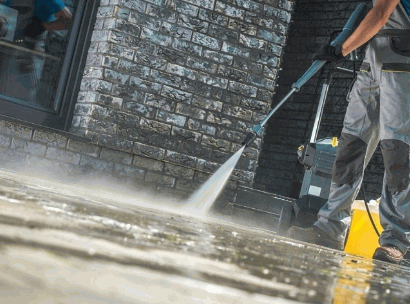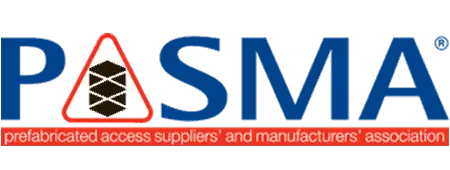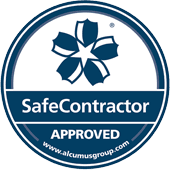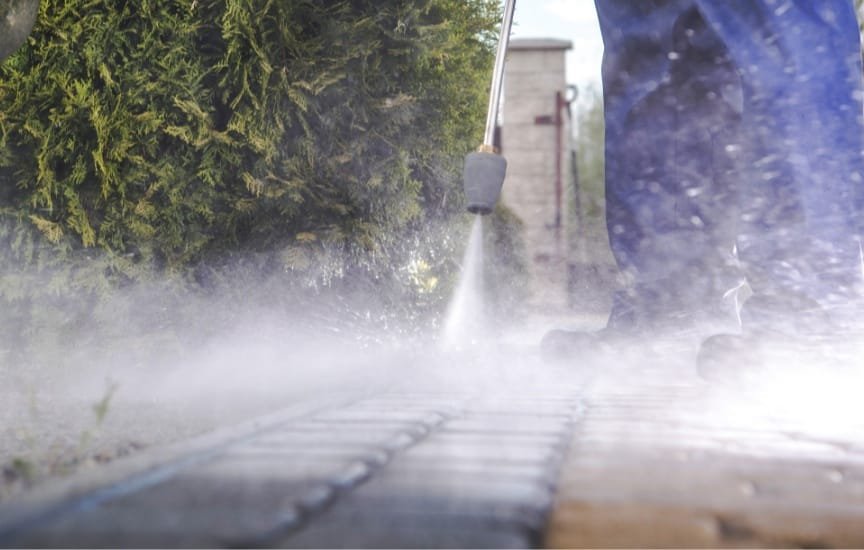
If you're based in the London area and you're looking into pressure washing prices, it's easy to become bamboozled by all the information out there on the internet.
As a professional cleaning service based right here in the capital, the London Power Washing Team can cut through all the nonsense and provide clear, helpful advice.
In this blog, we'll explore all the ins and outs relating to the cost of pressure washing and explain everything in as much detail as possible without getting too technical.
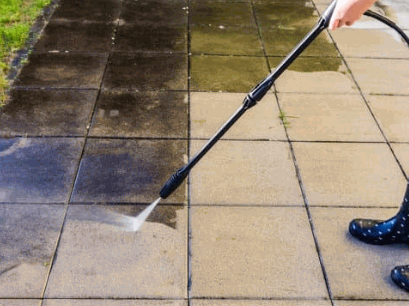
There are several factors to consider, so we'll break these down into bite-sized pieces...
First, we need to look at the nature of the job. Is it driveway cleaning? Are your patio slabs seriously filthy? Do we need to tackle chewing gum removal? Maybe it's your walls, roof, gutters or conservatory?
All of these tasks have different operational costs to consider, so we'd need to know exactly what needs cleaning before providing a quote.
If you're planning to book a professional driveway clean, we'd need to know the dimensions first. Clearly, a large driveway would cost more to clean than a medium-sized driveway, and a small-sized driveway would be the cheapest.
The same rule obviously applies to cleaning roofs, walls and other large surface areas.
Most professional cleaning companies charge per square metre (check the units in case they use square feet!), so you'll need to measure accurately.
It's important to assess the condition of the area or feature that needs cleaning. Heavy soiling or stubborn stains will need extra attention, maybe even specialist cleaning solutions.
The dirtier the surface, the more work will be required to shift it, resulting in increased working hours and labour costs.
While pressure washing is pretty effective at dealing with a range of tasks, it sometimes needs a helping hand. Chewing gum removal, for example, may require steam cleaning or a dedicated gum removal machine.
Any additional treatments will add to the total cost of pressure washing.
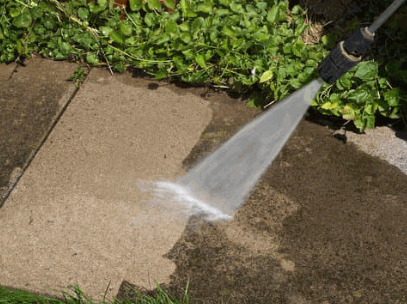
Different surfaces require specific methods, and the costs vary depending on this.
For example, we may be able to use a pressure washer to clean a stone, concrete or brick driveway, but this may not cope with oil stains. Oil stain removal might need something a bit stronger, like a powerful degreaser.
Wooden decking or fences need to be handled more gently, so the pressure washer will have to be adjusted accordingly. Again, detergents or degreasers may be necessary, but these must be compatible with the timber.
The same applies to roofs, with the extra consideration of requiring a safe working platform.
This element makes up around half of the cost of pressure washing, so it's an important one to consider!
The more workers are needed, and the longer they're on site, the higher the final cost will be. As we're looking at London prices, these will generally be higher than elsewhere.
Many areas of London have strict parking laws or access is restricted due to trees, buildings or other obstacles. A solution can usually be found, although it takes creative thinking and special arrangements, and this adds to the cost.
There may also be additional costs if scaffolding is required for pressure cleaning a roof or the upper floors of a property that are beyond reach from ground level. Ideally, the team could use a mobile elevated work platform (MEWP) or cherry picker, but this isn't always an option in some of the narrow urban streets in certain areas of London.
In some areas, local authorities and water companies strictly regulate wastewater. Pressure washing uses a fair amount of water, and this has to be managed carefully to avoid pollution. Surface water drains are designed to capture rainwater only, so cleaning companies are prohibited from diverting wastewater into these drains.
Wastewater can contain oil, debris, paint and chemical cleaners, which cannot enter the rainwater drains, as these often flow into rivers or lakes.
This means we need to either collect the contaminated water (especially where surface grease and heavy oil stains are involved) or ensure it is redirected into foul water drains.
Different companies charge different rates, and some apply a minimum charge (for example, if your cleaning job covers 20 square metres, they'll charge for 30, if that's their minimum charge).
The rates they charge should reflect the standard of service you receive, so try to avoid local tradespeople or handymen who charge very low prices: they rarely deliver the promised results and seldom use high-quality machines.
Instead, look for an established company with a good professional reputation - like the London Power Washing Team! We offer fair, reasonable and competitive prices and provide a first-class service.
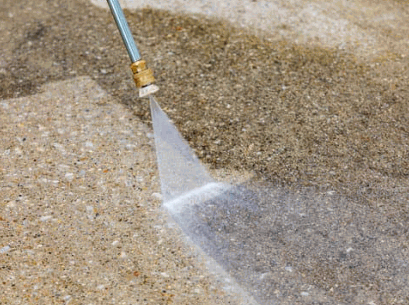
The ONS (Office of National Statistics) states on its website that price levels in London are, on average, about 7% higher than elsewhere in the UK. However, other sources show that prices for goods and services can be up to 40% higher. And a 'decent standard of living' in London is currently 58% higher than the rest of the country.
This affects the cost of pressure washing, too, with prices per square metre being higher here than in other parts.
With all these factors in mind, it's time to look at some examples. We'll suggest a range of scenarios along with some ballpark figures to give you an idea of what to expect:
The average driveway/patio cleaning cost typically falls between £2 and £3 per square metre. For smaller spaces, such as a driveway or patio up to 20 square metres, you can expect to pay between £100 and £150. For medium-sized areas (30-50 m²), the price increases to around £150 to £250. If you have a large driveway or patio exceeding 50 square metres, the cost can range from £250 to £500 or more.
Several factors influence the price of having your patio or driveway cleaned. The type of surface plays a key role—whether it's concrete, stone, or block paving. The level of staining, including things like oil, algae, or moss, can also affect the cost, as more intensive cleaning may be required. Additionally, if you opt for sealing the surface after cleaning, this can further increase the overall price.
Check out our posts for more details “How much does patio cleaning cost in London” and "How much does driveway cleaning cost in London".
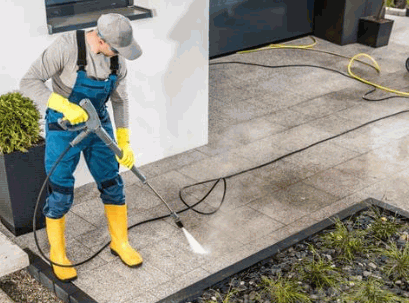
For decking, pressure washing costs tend to be slightly higher, ranging between £3 and £5 per square metre. For a small deck, up to 20 square metres, the typical cost falls between £100 and £150. For medium decks (20-40 m²), you can expect to pay around £150 to £250, while large decks over 40 square metres will cost £250 to £500 or more.
The main reason for the higher price is the delicate nature of wood, which requires lower pressure and more care during cleaning to avoid damage. If your decking has mould or algae buildup, the use of specific cleaning agents to treat these issues may increase the overall cost of the service.
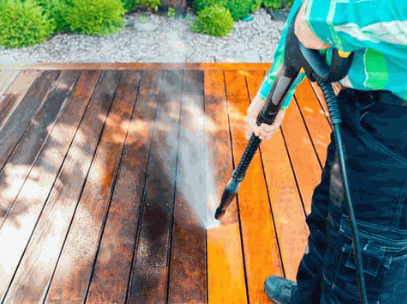
Pressure washing walls and fencing usually costs between £3 and £5 per square metre. For a small section of fence or wall (up to 20 m²), the price is generally around £100 to £150. Medium-sized jobs (20-40 m²) are priced between £150 and £250, while larger areas (over 40 m²) can range from £250 to £500 or more.
The cost will depend largely on the material of the wall or fence - whether it's wood, brick, or concrete. Other factors include the presence of mould, dirt, or graffiti, which may require specialised cleaning agents to remove effectively.
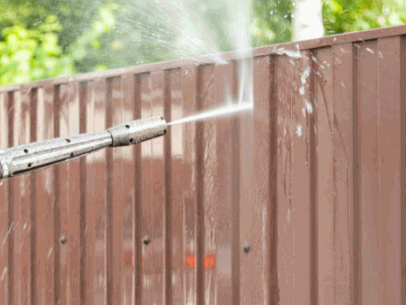
Roof cleaning is a more complex and costly task, with prices typically starting at £300 and reaching upwards of £1,000, depending on the size of the roof. A small roof, such as a terrace or garage roof, will generally cost between £300 and £400. For a medium roof (up to 100 m²), prices rise to £400 to £700, while a large roof (over 100 m²) can range from £700 to £1,000 or more.
Roofs require specialised equipment and additional safety precautions, which contribute to the higher cost. The presence of moss, algae, or lichen also makes the job more labour-intensive, potentially increasing the overall price.
Read our post "How much does roof cleaning cost in London".
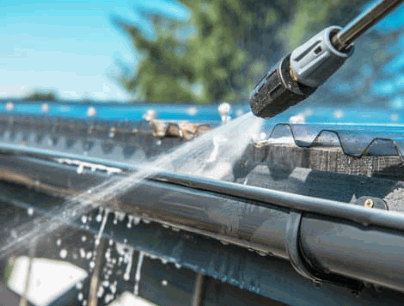
It's tempting to think that you could save money by hiring or buying a pressure washer and doing the job yourself.
While this is understandable, it might not be the best or most sensible option for many people.
First, you need to decide what your budget is. Pressure washers range in price from around £60 to well over £2,000, so it's difficult to know how much you need to spend to get an adequate model.
Next, you have to choose how much power you need, and that depends on what you want to use it for. The pressure is measured in 'bars' or PSI*, so you need to understand what these terms mean and how they relate to your needs.
*One bar of pressure is equal to approximately 14.5 PSI (pounds per square inch)
For example, for light dirt, maybe on a fence, decking or garden furniture, 100 bars of pressure will suffice. For cleaning your car, gutters or patio, you'd need somewhere between 110 and 130 bars.
Finally, if you need a model for heavy-duty work, say, a large driveway with tough stains or pool tiles affected by green algae, you'd need 130 to 150 bars of pressure.
The best option is to buy a model with variable pressure, although these will generally be more expensive.
On top of this, you need to consider the following:
The last thing to consider is whether it's a good investment; will you actually use it often enough to justify the expense? You might clean your own driveway once in a blue moon, but is it worth it?
In the end, only you can decide!
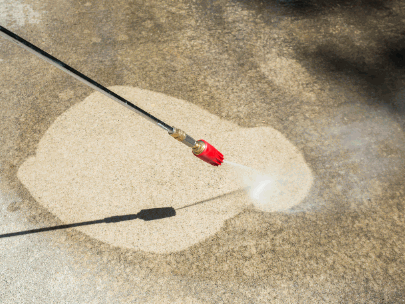
Of course, hiring a machine to pressure wash your block paving or patio is an option, but it comes down to this:
Pressure washing can be time-consuming and physically demanding, especially when tackling larger driveways. When renting a machine, you need to learn how to use it effectively, and then prepare and clean the area, which can take several hours.
A professional cleaning service does everything for you, getting the job done efficiently and probably in half the time, saving you a considerable amount of effort.
While you might be able to achieve good results with a rented machine, a professional pressure-washing technician uses industrial-grade equipment and has the skills and experience to achieve perfect results. It's very unlikely that you'll get the same level of thoroughness or precision.
Also, using the wrong settings or techniques, or using an unsuitable detergent or cleaning solution, could result in poor results.
Skilled cleaners know how to deal with different materials and surfaces, adjusting the technique and settings accordingly.
An inexperienced person may cause permanent damage to the surface or nearby items (or themselves!) if they use the machine incorrectly.
Most people, when using a power washer or pressure washer for the first time tend to use too much power. The belief that more pressure equals better results is an enduring myth that causes untold damage!
First, you've got to choose a suitable machine, hire it, and arrange for delivery (if they do this) or collection. You have to set the machine up and sort out any detergents you're using, then there's the steep learning curve of using a pressure washer for the first time.
You need to deal with any problems or technical issues that arise, as well as handle the cleaning process itself. Then you need to clear up afterwards and arrange for the collection of the machine (or return it yourself).
A professional driveway cleaning company, like the London Power Washing Team, will provide a 100% hassle-free experience, leaving you to enjoy the perfect results.
Also, you need to consider the cost of hiring a pressure washer. A medium-sized driveway will cost around £350 or so if you use a pressure washing company, whereas hiring a decent machine to do the job yourself will set you back between £180 and £250.
In the end, the choice is yours. However, hiring a machine only makes sense for very small-scale projects with light soiling.
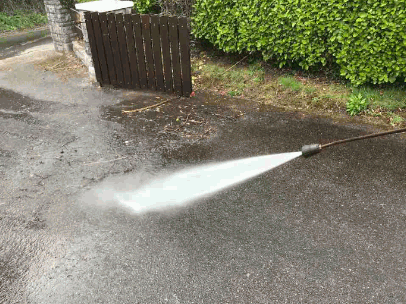
It's worth taking a moment to talk about this, as the names are widely used and people often refer to one type of machine when they mean another!
It's important to the London Power Washing Team that you know exactly what service you're getting, so we're here to clear up the confusion.
Pressure washers use high-pressure water forced through a nozzle to create a spray. This machine uses cold water (from your household water supply) and is effective at shifting dirt, algae, moss growth and surface debris. It's also referred to as a jet washer, and these are one and the same.
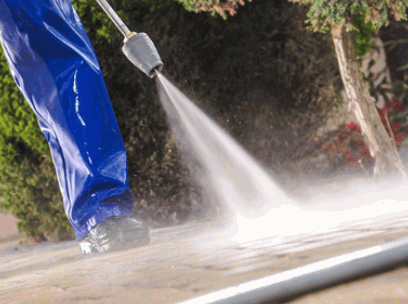
The main difference is that a power washer uses hot water, allowing for a deeper clean. This makes it better for shifting stubborn grease, tougher stains or heavy grime. These aren't as common as pressure/jet washers and are often reserved for industrial or commercial cleaning.
So, now you know the difference between the terms power wash, jet wash and pressure wash!
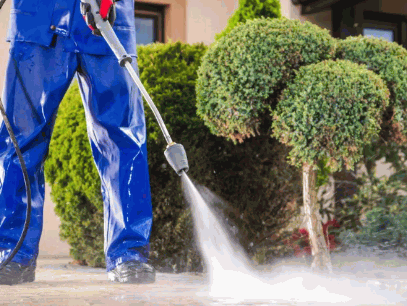
Regular cleaning is beneficial for several reasons.
First, you'll save money in the long term; there'll be less intensive cleaning as there'll be a light accumulation of dirt. This means the cost of pressure washing will be lower.
Also, the accumulated dirt won't have a chance to cause any damage, meaning you'll save money on expensive repairs and maintenance.
Finally, when you need exterior surfaces pressure washed, whether it's a small driveway, paving slabs, patio or decked area, get in touch with the London Power Washing Team for a professional finish with every project.
